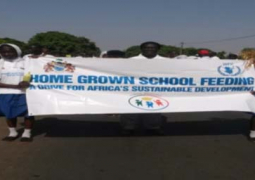They were charged with unlawful assembly and prohibition of conduct conducive to a breach of the peace.
The accused persons are Lamin Marong, Lamin Sonko, Foday Gassama, Maimuna Darboe, Ousman Drammeh, Sherrif Kinteh, Jerreh Fatty, Fakebba Colley, Sirreh Sonko, Bakary Gibbba, Wandifa Kinteh, Kawsu Jaiteh, Yaya Njai, and Lamin Njai, all denied the charges.
In his submission, prosecutor Sarr said the prosecution called six witnesses who testified. The first and fourth prosecution witnesses told the court that the accused persons were found under a mango tree, having a political meeting, which was not disputed by them.
This was clear in the confessional statement of the 11th and 12th accused persons, who were the hosts to the other accused persons, who were not residents of Madiana village.
He added that throughout the trial, the defence had not disputed that fact in the cross-examinations of the witnesses, adding that the first prosecution witness told the court that he being the alkalo was never aware of the meeting at his village, which was very abnormal.
The second prosecution witness also testified that he and his men arrested some of the accused persons, and further stated that the 3rd accused person was making comments at the time of their arrival at the scene, saying that they are citizens of this country, and as such they should not fear to show their political status.
They even resisted arrest, which resulted in a push-and-pull between the police and the accused persons, and the witness further stated that when the accused persons were taken to the station some of them refused to give statements, the prosecutor went on.
Prosecutor Sarr further submitted that the defence counsel in his submission cited the definition of unlawful assembly.
He added that the behavior of the accused persons, by holding a meeting at Madiana village without the consent of the alkalo, and the refusal of the accused persons to give statements at the police station, clearly showed that their meeting was illegal; otherwise they would have told the police the agenda of their meeting or informed the alkalo.
He added that it was the behavior of the accused persons that frightened the neighbourhood, until they reported the matter to the alkalo who in turn reported it to the police.
The defence also cited authorities as to where an unlawful assembly could be committed, and it was clear that an unlawful assembly could be committed anywhere, the prosecutor continued.
He said even though the accused persons were in a private compound, they could be in an unlawful assembly.
“The prosecution is convinced that they have laid a case against the accused persons, and are urging the court to call on the accused persons to enter into their defence,” declared the prosecutor.



